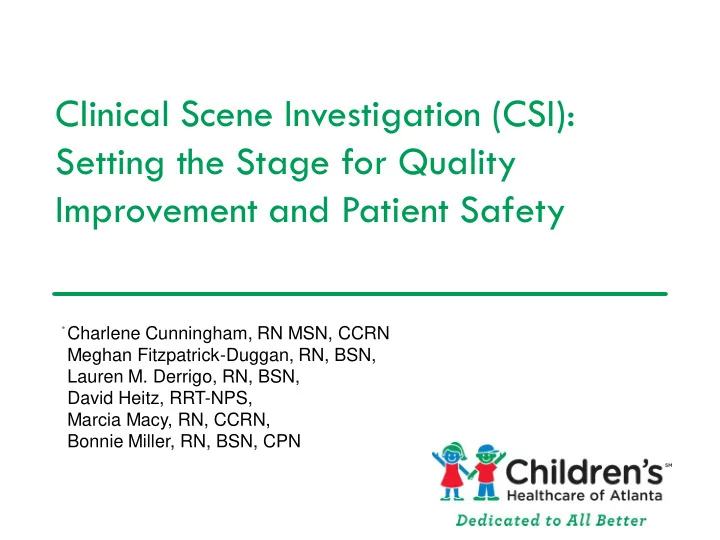

Clinical Scene Investigation (CSI): Setting the Stage for Quality Improvement and Patient Safety . Charlene Cunningham, RN MSN, CCRN Meghan Fitzpatrick-Duggan, RN, BSN, Lauren M. Derrigo, RN, BSN, David Heitz, RRT-NPS, Marcia Macy, RN, CCRN, Bonnie Miller, RN, BSN, CPN
Traditional Patient Safety Education • Policies & Procedures • Practice Alerts • Accreditation standards • Audit Reports • Collaborative Reports Children’s Healthcare of Atlanta 2
How CSI came about… • The project is an adaptation of a competency validation method developed by John F. Dixon, RN, MSN. – 4 Criteria for Identification of What to Validate • New procedures, policies, initiatives • Change in procedures, policies, equipment • High Risk areas • Problematic areas Wright (2005) Children’s Healthcare of Atlanta
Background • The staff of the Pediatric Intensive Care Unit (PICU) at Children’s Healthcare of Atlanta, Egleston consists of 118 nurses and 28 respiratory therapists. • Annual competency validation is composed of 4 hours self-guided education and 4 hours class education with skill verification for high-risk, low volume skills. Children’s Healthcare of Atlanta
CSI Objectives Main Objectives Participant Objectives • To validate the staff • Mandatory Participation member’s ability to • Complete in 15 minutes recognize risks to patient • Record a minimum of 10 safety in a clinical setting patient safety risks/errors using a scene scenario and simulation environment • To Receive feedback from staff re: CSI experience • Minimize impact on non- productive time (NPT) Children’s Healthcare of Atlanta
CSI in PICU • The PICU PS&Q multidisciplinary team identified patient safety risks for ICU patients – Incident reports – New or Modified clinical procedures or processes – PICU quality initiatives – New policies or standards that needed reinforcement Children’s Healthcare of Atlanta
Errors to find from 6 Categories: General & Bloodstream Equipment & Medication Infection Procedural Safety Prevention Accuracy Ventilator- 2012: Associated Pressure Ulcer Pneumonia Prevention CAUTI Prevention Prevention Children’s Healthcare of Atlanta
Team Involvement • Pharmacy • EMR specialist • Medication Safety Specialist • System Quality Team • Quality and Patient Safety Council • Professional Development Council Children’s Healthcare of Atlanta 8
Examples of Simulation • Planned 30 nursing and respiratory errors for CSI – Non-occlusive CVL dressing – Intravenous line contamination – Endotracheal tube insecure – Medication and infusion drip errors – Mislabeled specimen – Patient identification errors – Inadequate pressure ulcer prevention – Clamped chest tube – Pressure line management errors – Inadequate ventilator-associated pneumonia prevention – Isolation protocol errors Children’s Healthcare of Atlanta
What our Detectives Found… • Ventilator-Associated Pneumonia risk – Fish-hook on ETT – Condensate drains to patient – No mouth care kits available • Biohazard Waste Disposal Errors • CLABSI Risk: – Dressing – Line Contamination • Pressure Ulcer Risk – Syringe under patient
Challenges for the Team • Staging the scene – Completed by 11 council members within 2 hours: full council participation • Maintenance of scene integrity – Council members assigned to refresh scene during scheduled clinical shifts • Avoiding unintentional errors – Review scene after first 20 observations to remove distracters • Patient Census – Planned program during historically lower census period to use an unoccupied patient room for the scene • Feedback to participants – Professional Development Council received list of scene errors and developed rationale with policy citation – Each participant received a copy of errors staged by the team, rationale, and their original scorecard Children’s Healthcare of Atlanta
Results: 180 Evaluation Return Rate 80.0% 160 70.0% 140 60.0% 120 50.0% 100 2011 80 40.0% 2012 Return Rate 60 30.0% 40 20.0% 20 10.0% 0 0.0% Total Participants RN RCP 2011 2012 Children’s Healthcare of Atlanta
Time to Complete CSI 70 60 50 40 30 2011 2012 20 10 0 < 15 min < 30 min <45 1h Children’s Healthcare of Atlanta 13
Completion Occurred 90 80 70 60 2011 50 2012 40 30 20 10 0 During shift Before/after Come in Children’s Healthcare of Atlanta 14
Non-Productive Time For Competency Validation 1000 900 800 700 600 Annual 500 CSI 400 300 200 100 0 Number of RN/RCP Staff NPT RN-i Total RN-NPT (I & P) Children’s Healthcare of Atlanta 15
Comments • “What was the most How Valuable Was This valuable?” Experience? 60% – “Fun & educational” – “Discovering details” 50% – “Helped me to think 40% about preventing 30% mistakes” – “Increased awareness of 20% errors” 10% 0% Very Valuable Neutral Somewhat Completely Invaluable invaluable Children’s Healthcare of Atlanta
• “What was the least • “What recommendations do valuable?” you have to improve the overall experience of CSI?” – “Little time -consuming, but worth it” – “Teaching beforehand” – “Only having 15 minutes” – “Live Simulation” – “Trying to do it during a shift” – “Let us know the number of things we are looking for” – “Not so many errors, maybe focus on specifics” Children’s Healthcare of Atlanta
Conclusions: • Overall, CSI was viewed as a valuable educational experience by staff based on evaluation comments and feedback. • CSI required minimal non-productive time. Children’s Healthcare of Atlanta
Implications for Practice • Cost-effective method of staff competency verification to recognize clinical errors in a patient environment • Project may be replicated for other patient care areas with adaptations to their patient safety and quality improvement needs Children’s Healthcare of Atlanta
Acknowledgements David Heitz, Lori Emilus, Sarah Piland, Meghan F. Duggan, Lauren Derrigo, Bonnie Miler, Kim May, Sally Morris, Susanne Hannada, Charlene Cunningham PICU Professional Development Council Children’s Healthcare of Atlanta
Contact information: Charlene Cunningham Daytime Phone: 404-785-6424 Fax: 404-785-6593 Email: Charlene.cunningham@choa.org Meghan Fitzpatrick Duggan Work phone: 404-785-6006 Email: Meghan.fitzpatrick@choa.org Children’s Healthcare of Atlanta
Recommend
More recommend